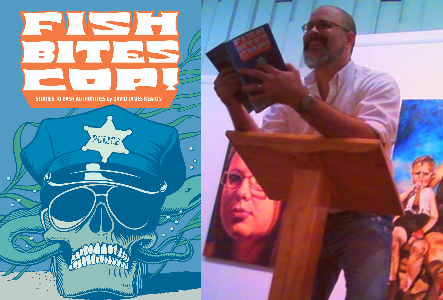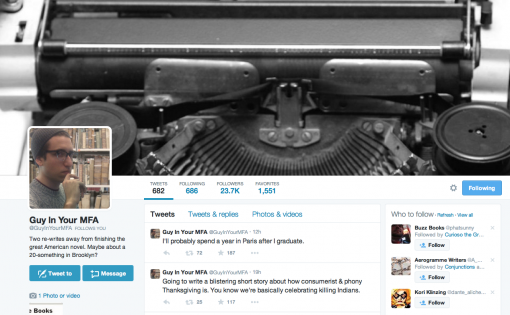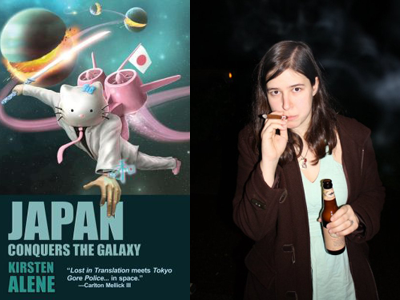

David James Keaton’s work has appeared in over 50 publications, including recently Grift, Chicago Quarterly Review, PANK, and Noir at the Bar II. His contribution to Plots With Guns #10 was named a Notable Story of 2010 by storySouth, and last year he won a Spinetingler Award for the Best Short Story on the Web. His first collection Fish Bites Cop! Stories to Bash Authorities was released in May.
Monkeybicycle: Fish Bites Cop! is a very cool collection that’s sort of madcap wildness and horror but also generally pretty funny. The stories tend to have a very conversational feel as well. How important is voice when you set down to write a story? What can an intimate conversational tone add to horror?
David James Keaton: Thanks for reading it! I do try hard for a conversational tone, shooting for that kind of “Can’t wait to tell you this while you’re driving!” story, especially in the first-person ones like, “Life Expectancy in a Trunk” and “Third Bridesmaid from the Right.” Actually “Life Expectancy..” probably sounds conversational simply because I had a lot of practice a couple years back complaining about Dog the Bounty Hunter pretty much nonstop. Ripping on him and his horrible family for several pages was about as natural as breathing, but I think I was so excited to write an attack on Dog because he was coming to Toledo, my town at the time, to sign copies of his “book,” – something I can only assume was a pop-up – and I was hoping to give him my short story. I’m not sure why it seemed so important to me to upset him back in 2008. Oh, yeah, now I remember. He’s a monster! This probably sounds like I was arrested by him or he owes me money or something, but it’s mostly because he was one of my first experiences with reality television. And all the horror of that medium was channeled through that grandstanding, shambling peacock of a man. And his crew? Running around with their super-soakers of pepper spray and man-handling traffic violators to look tough for the cameras? So gross. But yeah, a story constructed around a rant probably comes out very conversational anyway, if only because of the speed. “Third Bridesmaid..” is also based on a couple anecdotes involving a friend of mine, and telling that crazy story to embarrass my buddy every chance I get means it also comes out with a “Get a load of this…” momentum already built in. To answer your questions about horror, I think these kinds of loose opening conversations can serve the same purpose as that opening 20 minutes in a horror movie where you get to know your cast before the freaky stuff goes down. In my opinion, breezing through two or three dead-on dialogue exchanges is worth ten pages of character-building backstory. You can tell the reader a million facts about a character’s life, past, goals, etc., but I feel I really know who I’m dealing with as soon as they open their mouths.
Once I saw a man so angry he ate his goddamn phone. Light flickered behind his teeth like he was chewing a firefly sandwich, and I could hear a screeching voice drowning in the tiny speaker on his tongue. I watched the orange glow fill his mouth with the same excitement I used to get lighting the first candle in a new pumpkin, maybe not the same excitement I’d get stomping on it afterwards. I imagined what this must have sounded like on the other end of the line. You think it’s loud when someone calls you up and starts eating an apple in your ear? How about eating the fucking phone instead? I’m glad it wasn’t me who called. He was standing on a street corner, suit and tie, straight-laced bastard, casually watching traffic while his jaw muscles bulged. He had a look on his face like he was doing nothing stranger than working on an old piece of gum to launch a bubble. One minute he was standing there talking. Next minute he was arguing. Next minute… crunch. His mouth trickled strings of blood down his chin by the time he was working his way into the meat of the keypad and all those flickering numbers.
That day was my last class, twenty years ago, when those big phones were no joke . . .
Mb: Jedidiah Ayres describes Fish Bites Cop! as ‘like watching a David Mamet-directed staging of an off-script, largely improvised production of My Dinner with Andre & Zombies starring Joss Whedon and Duane Swierczynski, with Chuck Palahniuk heckling.’ As odd as that sounds, I found it to be pretty perfect here. It’s a very fun collection, even when it’s twisted and deranged and sort of horrifying. I often feel as if so much short fiction is weighed down by seriousness. How important is it to you that stories be fun?
DJK: Ah, Jed. Yeah, that description in his introduction was pretty hilarious, especially since if anybody can pin down your influences it’s that guy. Have you seen the stacks of movies in his basement?! It’s like a wall of VHS tapes upon tapes that probably swings out when you turn the candlestick to reveal even more tapes, better yet, have you checked out his debut novel Peckerwood. Damn, it’s finally gonna turn some slowpokes into believers. But I knew he’d appreciate the layers of movie talk in there, because we’ve talked that talk in real life many a night. And I like that charge you get when you share memories of a scene or a line. I’d rather hear someone tell me what they were doing the first time they saw Robocop rather than where they were when JFK was shot (“I was watching Robocop!”) And that’s kind of what I want when you recognize the nod. I think that’s fun. There’s the fun of knowing you’re in on the joke, but I also hope there’s fun in not knowing how far things will go. A lot of these stories were written as sort of an internal one-upmanship, at the same time figuring no one but close friends who made the mistake of showing an interest in reading something of mine would ever suffer through the damn things (the rest were written while watching movies), so I wanted to make sure it was, above all, fun. Fun like funny, yeah, but also fun as in “Is this really heading in that direction – yep. You got me.” But there is some seriousness tucked in there, whether I wanted it or not. Typically towards the end of the stories, right about when I start to feel bad about what I wrote, but it’s way too late to go back and change it.
Mb: I know you’re a big film guy, so what can you learn about writing from film that you can’t learn from fiction? What kind of filmmakers influence your fiction?
DJK: Bad ones, good ones, all of them. Sometimes the worst movies are a great exercise in idea-making because you’re watching a movie and stacking up all the missed opportunities in your head. Every time a scene doesn’t satisfy, you can say, “Thanks!” and use it yourself. Every time that character says something ridiculous or not ridiculous enough, say, “Thanks!” and stick it in your mouth. This happened when I saw Die Hard, the first two Die Hard movies actually. The first one is great, of course, and the second one is terrible, except maybe when that guy gets stabbed in the eye with an icicle. But only because you can imagine the police at the crime scene looking all over for a weapon, which would have melted! Genius! But wait, of course they forgot to put that in the movie. Thanks! But in those movies, Bruce Willis is doing this crazy amazing shit and saving everybody, more or less so he can just save his wife. And when he finally gets to give her that bloody, sweaty embrace at the end, full of bullet holes and pained but noble grimaces, he would always shrug it off with some quip like, “Sorry I was late” or just play it cool. I don’t remember what it was he said exactly, but whatever it was drove me nuts because that’s not what he should be saying! He should be saying something like, “Where have I been, you ask? Holy shit, you have no idea. I shot about five guys, was hanging off this helicopter, killed some dude with an icicle – good luck pinning that on me, NYPD! – at one point, and you will never believe this, baby, I hit an ejector seat in this plane while it was just sitting there on the runway, and I had no idea what this would do, turns out it worked because up I went, screaming all the way – oh, I almost forgot, I dressed up a corpse like Santa Claus for kicks. Oh, yeah, remember that asshole Ellis you used to work with? I accidentally got him killed, so you get his corner office after all. I remember you said you wanted it…” See, that’s the kind of stuff I wanted to hear. Why did they always play it cool, you know? Movies sort of do this now on occasion, but it’s never sincere, always a throwback to the ‘70s or ‘80s. For example, Anchorman does a hilarious riff on scenes like that, which have become internet famous (“Well that escalated quickly!” “I stabbed a guy with a trident!”), and Pineapple Express had an epilogue that sort of did it, too (“You dipped your toe into murder”), and the wonderful Kiss Kiss Bang Bang pretty does it for the duration of the movie. That one was more sincere than most with its throwback love. Shaun of the Dead, too, which also had some amazing moments of self-realization in a zombie apocalypse that I’d been craving since the ‘80s heyday.
Mb: Zombies have been done over and over again, and there’s the recent zombie craze which led to the inevitable zombie backlash, but I keep seeing more and more zombie fiction from people like you and Stephen Graham Jones and others. What is it about zombies that sticks with us? What can zombies tell us about ourselves, and how do we make a saturated idea feel new?
DJK: I don’t want to sound like the guy who was into bands before they were cool, but I was totally into zombies before they were cool. But so was everyone else. Speaking of fun, if you want to talk about fun, Stephen Graham Jones’ Zombie Bake-Off is the most trope-smashing/celebrating fun you’ll find outside of the theater. And back when they were more unfashionable, I wrote some zombie stuff to try to put a new spin on it, too. “Greenhorns” in Fish Bites Cop! is a mash-up of zombies and the crab-fishing show Deadliest Catch. If Dog the Bounty Hunter is the ninth circle of Hell when it comes to reality shows, Deadliest Catch, at its best, is a little slice of heaven. At its worst, maybe the ninth circle of Heck. The other longer undeadish horror story in there, “The Ball Pit (or, Children Under Five Eat Free),” is less about zombies and mostly about those Brazilian wandering spiders whose bites can give you endless erections — ‘cause a zombie is all stiff, right, kind of a walking version of the male-enhancement commercial “If you have an erection lasting for more than five hours, call the doctor. And if you have a full-body erection lasting for weeks, you’re in a zombie apocalypse . . .”
But since I wrote those, you’re right, this backlash has kind of happened. Which made me not want to write about zombies anymore. Then it made me really want to write about zombies because they were wonderfully unfashionable again! Full circle. Zombie snake eats its brain (actually it’s worms that have another brain in the tail, right?). Okay, almost unfashionable. We’re still pretty saturated though, so I’m probably zombied out for a long while. If I have to read one more student essay about what would happen to society in a “real” zombie apocalypse (translation, “Guns Are Sweet”), I’m gonna kiss a Brazilian Wandering Spider.
“Kill it,” Mud said.
“Why not?”
“Damn right,” Red laughed. “Hell, I wish there was a goddamn unicorn in here so I could shoot that, too.
Mb: When I think of MFA graduates, you’re not really what comes to mind, and your stories don’t feel like MFA stories to me. But I’ve never taken writing courses, so maybe I’m talking out my ass, but do you find that there’s a sort of acceptable and recommended style for MFA programs? How did your MFA experience influence the way you write?
DJK: I think my undergrad experience probably influenced my writing more than grad school. At BGSU, I was lucky to meet Mike Czyzniejewski and Karen Craigo, and there I saw my first literary readings in their little chapel and heard Mike read “Street Fishing” and read some good books and stopped thinking about movies as much. Those scrappier undergrad workshop experiences are more vivid in my brain — workshop boycotts by classmates that hated my stories, doors slamming, everyone trying on their new voices. And there was such a gap between getting my BFA and my MFA that I’m not sure I’d do it again. When I first got to the University of Pittsburgh, my first class was with a professor who was so checked out that we were actually drawing with crayons and meditating, and after my first story with one word of feedback, I ran out and got a full-time job close-captioning reality television and pornography (where I met Dog and Deadliest Catch, of course), figuring this grad school thing was never gonna work. But a community grew in Pittsburgh anyway, everyone thankfully agreeing that drawing with crayons was ridiculous, and we wrote on our own lots of stories that weren’t very MFA-style at all, and we formed Hot Metal Bridge and did our own reading at ol’ Fuel and Fuddle. And we all hung around Chuck Kinder’s house, and I started to rack up some solid work, and things got better. I was lucky to find Chuck Kinder at Pitt and have him as a mentor. Chuck encouraged the more unhinged aspects of my writing, going against a lot of the expectations of the program. MFA programs are likely there for discipline, possibly rightly worried about young writers unable to control their new voices. In my case, I got there late, spending about a decade longer at BGSU than I intended, painting houses and taking one or two classes a semester. So the self-control ship had sailed, and Chuck realized this. He gave me a stack of books to read, Barry Hannah, Tristam Shandy, Tom Jones, which was his way of saying this reckless thing I was doing was really part of another discipline, a tradition. Which probably ruined me forever. He also coaxed a two-thousand-page thesis out of me, then demand I only use the first third. Don’t let Michael Douglas’ portrayal of Chuck in Wonder Boys fool you – clutching those typed pages to his chest like one of his cats. Okay, he probably wouldn’t have chased those loose pages into the Ohio River, but I would have. Hey, he always had chicken wings and fried mushrooms when our workshops were at his house, so I can’t complain.
Lately, I’ve reassessed my MFA experience. And I’ve decided, what the hell else was I going to do back then? Keep close-captioning [moaning intensifies] and [door slams] when you could tell they probably faked both those sound effects to make things seem more dramatic than they are? Actually captioning the Puppy Bowl was pretty sweet.
Speaking of Mike Czyzniejewski, since I’m here at Monkeybicycle, he was my introduction to this joint! I was tracking down his stories, and found “Valentine” in a Monkeybicycle issue — it had this amazing first line. “For the third year in a row, my wife visits her gynecologist on Valentine’s Day.” That right there, you’re hooked, but what solidifies it as more satisfying than the expected MFA story was the line that comes a page after that, “Two days later, I take a personal day and drop by Valerie’s OB-GYN . . .” Ooh, that escalated quickly! See how it wasn’t content just to ponder infidelity like a New Yorker story and jumped headfirst into stirring up some shit? Love that one. It also flips the script even more for the ending, but I’ll let people discover it for themselves. It’s collected in Elephants in our Bedroom.
Mb: You have a novel coming out with J. David Osborne’s Broken River Books next year, and it sounds awesome. I don’t have a question here, really, I just want you to talk about it.
DJK: I’d love to talk about that beast. It’s called The Last Projector, and J. David Osborne and I will be working on edits around the first of the year for a Summer 2014 release. I’m under the hood right now because I figured the best way to dull his scissors would be by getting there first. It’s kind of like what Scorsese did when he wanted to keep that scene in Casino with that Mafioso’s head in the vise, and the MPAA thought he’d gone too far. But he’d anticipated their resistance early in his process, and he filmed an extra couple seconds of an eyeball flying out of the guy’s head when Joe Pesci squeezes, but he did the effect all cheap and rubbery and on the fly since he never intended to use it. And then when the ratings board took the bait and made him remove the eye, he snickered because he was able to keep the head in the vise and turn that crank to his heart’s content. Suckers! But I hope J.D.O. doesn’t think this is some sort of sneaky confession and I’m leaving him a trail of rubbery eyeballs he can cut. What I’m saying is that Scorsese should have committed to that eyeball, loved that eyeball, and made it worth fighting for. This book is full of eyeballs is what I’m saying, and they’re looking for love in all the wrong faces. But yeah, the novel was kicked around awhile with no luck – back then it was called Spunkwater, back when chicken-hearted publishers were afraid to take a chance on it and would send me pages on how to neuter it – er, how to make the characters more “sympathetic.” So in my attempt to make the characters less sympathetic, it’s since evolved into something larger and cinderblock-like called The Last Projector, which as the title hints, is full of movie talk, as well as that other kind of projection, that unhealthy Freudian defense mechanism that’s bandied about by most of the characters, and most of us humans on a daily base. The book takes place in my fantasy version of the ‘80s, right around 1982-‘83 (sort of a post-modern riffing on what we think of it now), when Carpenter’s The Thing came out and was unfairly overshadowed by that freaky finger-banging, sugar junky E.T. In fact, the novel has an original rap song that a character writes as a love letter to The Thing, and to the girl whose working with him to blow up a drive-in. It’s also got a bit of the Cronenbergian body horror in it, as one of the main characters, a high-minded paramedic turned pretentious porn director, becomes obsessed with the abundance of tattoos on his actors and how this ruins the integrity of his storylines (example, if someone has “Joey” above the crack of their ass, and the other actor’s name is “Bobby,” you’d think a character would call a time-out and ask some questions, right?). There’s also a family with three-generations of women and their secret legacy of an assault, and how this subplot comes home to roost around a bunch of embarrassing male insecurities. Did I mention there’s a lot of E.T. bashing and love for The Thing? What else. There’s also a movie of a movie of a movie, some literal crashing through timelines, a kid obsessed with Evel Knievel who calls himself “Evil Boll Weevil,” who wants to jump his dirt bike over all the cars at a drive-in at just the right moment to impress the only girl in the world who doesn’t give a shit. There’s some good cops and bad cops, big cops and small cops, too. I haven’t grown out of the authority bashing just yet. Maybe next year.
Read more from / about David James Keaton here. Buy a copy of Fish Bites Cop! here.
Edward J. Rathke is the author of several books, one of them published [Ash Cinema, KUBOA Press 2012], two more coming out soon, as well as various short stories online and in print. He writes criticism and cultural essays for Manarchy Magazine and regularly contributes to The Lit Pub where he also edits. More of his life and words may be found at edwardjrathke.com.




